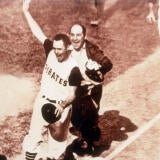Houston Astros cheating scandal: 10 things we learned from MLB's nine-page investigative report
The Astros were hammered by Major League Baseball on Monday for stealing signs
On Monday, Major League Baseball and commissioner Rob Manfred announced punishments for the Houston Astros stemming from the club's alleged sign-stealing scheme. It was revealed in November that the team devised a system to illegally steal signs throughout its 2017 World Series championship season. Here is a recap of the discipline:
· Manager A.J. Hinch suspended for one year. Hinch was then fired by the Astros.
· GM Jeff Luhnow suspended for one year. Luhnow was then fired by the Astros.
· Former assistant GM Brandon Taubman suspended one year.
· Astros forfeit their first- and second- round draft picks the next two years.
· Astros fined $5 million, the maximum allowed under MLB's constitution.
Manfred released a nine-page report detailing MLB's investigation and explaining how he arrived at the discipline. "I believe transparency with our fans and our clubs regarding what occurred is extremely important, and this report is my attempt to achieve that objective," he wrote.
Here are 10 key items detailed in Manfred's report, which also led to the ousting of Alex Cora as Boston Red Sox manager.
1. The Astros fully cooperated
The investigation covered the 2016-19 seasons and included interviews with 68 witnesses, 23 of whom are current or former Astros players. Some were interviewed multiple times. MLB also reviewed email and phone records, including text messages, and video clips. Manfred says the Astros fully cooperated with the investigation and provided "all requested electronic communications and making all requested employees available for interviews."
2. Crane was unaware of sign-stealing scheme
In the very first paragraph of Manfred's report, he states the investigation revealed no evidence Astros owner Jim Crane had any knowledge of the club's illegal sign-stealing efforts. From the report:
At the outset, I also can say our investigation revealed absolutely no evidence that Jim Crane, the owner of the Astros, was aware of any of the conduct described in this report. Crane is extraordinarily troubled and upset by the conduct of members of his organization, fully supported my investigation, and provided unfettered access to any and all information requested.
During a press conference Monday afternoon, Crane said he spoke to Luhnow when MLB issued memos throughout 2017 and 2018 warning clubs not to use electronics to steal signs, and told him to ensure the club did not engage in any such behavior.
3. The sign-stealing system evolved
Media reports alleged the Astros stole signs using a camera fixated on the catcher's signs, a monitor with a live feed in the tunnel between the dugout and the clubhouse, and by banging nearby garbage cans to relay the signs to the hitter. MLB's investigation found the sign-stealing scheme evolved over time. Here's the timeline:
- 2016 season: MLB's investigation did "not reveal any other scheme or method utilized by the Astros" to steal signs.
- Early 2017: The center field feed was used to decode signs when the Astros had a runner on second base. Once decoded, the sequence would be relayed to the dugout, and the runner at second would decode the signs and signal to the hitter at the plate.
- Two months into 2017: The garbage can method was implemented and the team began to pump a live feed to a new monitor in the tunnel. The Astros initially tried whistling and clapping before settling on the garbage can. The scheme is called "player-driven," with current Mets manager Carlos Beltran mentioned by name. Both systems were used throughout the 2017 season.
- Postseason 2017: Manfred's report says the club continued using their systems to steal signs during the postseason, even after all 30 clubs were warned that September to not use electronics improperly to steal signs.
- Prior to 2018: With MLB's approval, the Astros relocated their video room to a room closer to the dugout at Minute Maid Park, to a location similar to ballparks around the league.
- 2018 season: The Astros continued to use their video room to decode signs and relay them to the dugout. At some point during the season they stopped decoding signs "because the players no longer believed it was effective."
- 2018 postseason: MLB's investigation uncovered no evidence the Astros used electronic equipment to decode signs during the 2018 postseason.
- 2019 season: MLB's investigation "revealed no violations" during the 2019 regular season or postseason.
Long story short, the investigation revealed the Astros illegally used electronics to steal signs throughout the 2017 regular season and postseason, and also early in 2018. The report indicates the cheating starts and ends there.
4. Cora heavily implicated, loses Red Sox job
Alex Cora, Houston's bench coach in 2017 and the Red Sox's manager since 2018, is heavily implicated throughout the report. He's said to have called down to the video room to get signs early in 2017, which constitutes improper usage of a dugout phone, and he is also the only non-player mentioned by name who had a role in devising the garbage can system.
"Cora was involved in developing both the banging scheme and utilizing the replay review room to decode and transmit signs. Cora participated in both schemes, and through his active participation, implicitly condoned the players' conduct," the report says. The Red Sox are currently under investigation for a 2018 sign-stealing scheme in and Cora's punishment will be announced at a later date.
As part of the fallout from the league's report on the Astros' sign-stealing scandal, Cora was fired by the Red Sox on Tuesday. The league's investigation into the Red Sox's own sign-stealing scheme during their 2018 championship season is still ongoing. Cora's managerial career may be over, but he still awaits his punishment from the league. Our staff discussed Cora's likely punishment from his involvement in sign-stealing scandals with two separate teams.
5. Top baseball operations officials were not involved
Manfred's report says the sign-stealing scheme was almost entirely player-driven, with Cora the only non-player implicated. "The attempt by the Astros' replay review room staff to decode signs using the center field camera was originated and executed by lower-level baseball operations employees working in conjunction with Astros players and Cora," the report says.
Two emails were sent to Luhnow regarding the sign-stealing scheme and "there is conflicting evidence about conversations with Luhnow on the topic." Here's Manfred's statement on Luhnow's involvement:
Luhnow adamantly denies knowledge of both the banging scheme and the efforts by the replay review room staff to decode signs and transmit them to the dugout. The investigation revealed no evidence to suggest that Luhnow was aware of the banging scheme. The investigation also revealed that Luhnow neither devised nor actively directed the efforts of the replay review room staff to decode signs in 2017 or 2018. Although Luhnow denies having any awareness that his replay review room staff was decoding and transmitting signs, there is both documentary and testimonial evidence that indicates Luhnow had some knowledge of those efforts, but he did not give it much attention.
Luhnow was suspended because Manfred attributed the scandal to a "failure by the leaders of the baseball operations department and the field manager to adequately manage the employees under their supervision."
Manfred left the discipline of "lower-level Astros employees" with knowledge of the sign-stealing scheme to the Astros.
6. Hinch went so far as to damage monitors
Manfred's report states Hinch "neither devised the banging scheme nor participated in it," and on two occasions he signaled his disapproval by damaging the monitors used in the scheme. That said, the report says Hinch "did not stop it and he did not notify players or Cora that he disapproved of it," which led to his suspension.
7. 'Most' players on 2017 Astros were involved
"Most" position players on the 2017 Astros were involved in the sign-stealing scheme, either by decoding signs or relaying signs or receiving signs while at the plate, according to the report. "Many of the players who were interviewed admitted that they knew the scheme was wrong because it crossed the line from what the player believed was fair competition and/or violated MLB rules," the report says.
Furthermore, the report says many Astros players said they would have ceased stealing signs immediately had Hinch told them to stop engaging in improper conduct. Also, some players said they did not believe the sign-stealing scheme was effective, and more distracting than helpful to hitters, and there was a sense of "panic" when Astros players believed White Sox pitcher Danny Farquhar picked up on the garbage can banging in September of 2017 (2:58:30 mark on the clip below).
8. Players were not disciplined
Manfred's report calls the sign-stealing scheme "player-driven" and yet no players were disciplined. What gives? Within the report, Manfred notes that in a Sept. 2017 memo he warned teams that the general manager and manager would be held responsible for any such sign-stealing allegations. There's also difficult logistically to discipline players.
I will not assess discipline against individual Astros players. I made the decision in September 2017 that I would hold a Club's General Manager and Field Manager accountable for misconduct of this kind, and I will not depart from that decision. Assessing discipline of players for this type of conduct is both difficult and impractical. It is difficult because virtually all of the Astros' players had some involvement or knowledge of the scheme, and I am not in a position based on the investigative record to determine with any degree of certainty every player who should be held accountable, or their relative degree of culpability. It is impractical given the large number of players involved, and the fact that many of those players now play for other Clubs.
In a nutshell, MLB would need hard evidence a player played a significant role in devising and carrying out a sign-stealing scheme to even remotely begin considering discipline. Manfred shifted the blame to the general manager and manager in 2017 and is sticking with it.
9. Wearable and handheld technology was used
At various points in 2017, the Astros used various handheld devices to relay signs from the video room to the dugout. From Manfred's report:
On at least some occasions, the employees in the replay review room communicated the sign sequence information by text message, which was received on the smart watch of a staff member on the bench, or in other cases on a cell phone stored nearby.
The Red Sox were fined in 2017 for using Apple Watches as part of a sign-stealing system. Apparently the Astros had a similar method.
10. Manfred called the team's culture 'problematic'
The culture of the Astros has been a hot topic since Taubman was fired in October after harassing female reporters in the clubhouse following an ALCS game. In the report, Manfred expressed concern over the club's culture in his report and went as far as to call it "problematic."
(While) no one can dispute that Luhnow's baseball operations department is an industry leader in its analytics, it is very clear to me that the culture of the baseball operations department, manifesting itself in the way its employees are treated, its relations with other Clubs, and its relations with the media and external stakeholders, has been very problematic. At least in my view, the baseball operations department's insular culture - one that valued and rewarded results over other considerations, combined with a staff of individuals who often lacked direction or sufficient oversight, led, at least in part, to the Brandon Taubman incident, the Club's admittedly inappropriate and inaccurate response to that incident, and finally, to an environment that allowed the conduct described in this report to have occurred.
Manfred's observation is "gleaned from the 68 interviews my investigators conducted in addition to the nine interviews conducted regarding a separate investigation into former Assistant General Manager Brandon Taubman's conduct during a clubhouse celebration."


















